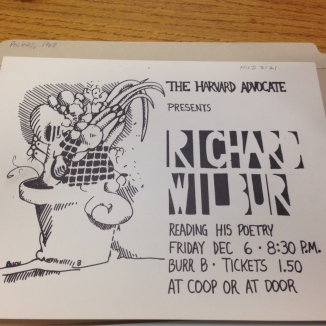A glance backwards through the Advocate’s storied past: In 1968, the sanctum hosted a reading by Pulitzer Prize winning poet, Richard Wilbur.


A glance backwards through the Advocate’s storied past: In 1968, the sanctum hosted a reading by Pulitzer Prize winning poet, Richard Wilbur.

Does God exist? Fuck if I know. I gave up on the Catholic Church at fifteen after seeing Jesus Christ Superstar. Christ was a megalomaniac, and I wanted to do Mary Magdalene. But I’m holding out hope for the hereafter. This week, the Harvard Community of Humanists, Atheists, and Agnostics (HCHAA) has invited me and my two lady Roommates to their meeting, to drink wine which ostensibly has little relationship to Christ’s blood and to talk about God, or the lack thereof. Atheists like wine because they don’t have spirits.
André Extra Dry: “crisp with notes of apple and citrus”
(“Egregiously a little over four dollars,” says my host)
André is like my sophomore year sex life: Sweet, dependable, and utterly unthrilling. Its bubbles go straight to my head in a sorry attempt to sweep me off my feet, but I am merely left headachy. At the same time, André…
View original post 634 more words
When he tells me that he has a knife strapped to his leg, I feel the first part of fear—shock—fill in behind my temples. The conversation doesn’t go well after that. Continue reading
 Like many unjustly marginal books, Helen DeWitt’s The Last Samurai is a novel that makes you want to proselytize. It makes you want to blog about it, laud it to your friends, brandish it in high-transit places in the hopes that another intrepid reader, impelled by the novel’s aura of genius, will come along and ask about it. Continue reading
Like many unjustly marginal books, Helen DeWitt’s The Last Samurai is a novel that makes you want to proselytize. It makes you want to blog about it, laud it to your friends, brandish it in high-transit places in the hopes that another intrepid reader, impelled by the novel’s aura of genius, will come along and ask about it. Continue reading
 Buried in Joan Didion’s homage to the Haight-Ashbury hippie culture of 1967, Slouching Towards Bethlehem, is a brief, almost throwaway reference to what Didion called “younger part-time, or ‘plastic,’ hippies.” Once amphetamines began to supersede acid and “grass”—the pillars on which the Haight culture Didion portrayed once stood—these ‘plastic’ hippies, who preferred the “illusions of action and power” supplied by the former, came to symbolize the “general deterioration of the scene.” Later in her essay, Didion describes a performance art Mime Troupe in blackface that handed out fliers announcing:
Buried in Joan Didion’s homage to the Haight-Ashbury hippie culture of 1967, Slouching Towards Bethlehem, is a brief, almost throwaway reference to what Didion called “younger part-time, or ‘plastic,’ hippies.” Once amphetamines began to supersede acid and “grass”—the pillars on which the Haight culture Didion portrayed once stood—these ‘plastic’ hippies, who preferred the “illusions of action and power” supplied by the former, came to symbolize the “general deterioration of the scene.” Later in her essay, Didion describes a performance art Mime Troupe in blackface that handed out fliers announcing:
IF YOU DON’T KNOW, BY AUGUST HAIGHT STREET WILL BE A CEMETERY. Continue reading
Renee Zhan is a senior concentrating in Visual and Environmental Studies. Her film Pidge (to be published in Part Two) was shown as part of the 2015 Telluride Film Festival.
I’m spending the summer after freshman year working in an old school surf shop in a small beach town in the South Bay, where I grew up. I work two days a week for minimum wage, and business varies— mostly slow in the afternoons, despite the droves of tourists who have discovered this idyllic pocket of suburban Los Angeles where my father, and his father, grew up. Continue reading

Originally published on Put A Egg On It.
The term “salad days” is a little abstruse, but I have a feeling these are mine. It’s my first summer living on my own – my first time doing all of the things that the incubator-esque housing system at my college guards against (i.e. paying for food and rent). And it has been marked by a distinct lack of green, both vegetal and fiscal. In the weeks leading up to my aunt’s wedding in Chicago, I look forward to it as my opportunity to go unapologetically all-out – to glory in the family maxim that states that ordinary eating outside one’s native zip code is impossible.
For us, vacation eats are characterized by two forms of decadence: the Uber-fancy, and what my mom calls the “sick.” The former means maître d’s that probably object to whatever I chose to wear during the…
View original post 1,380 more words
Luís Buñuel’s last and possibly best film That Obscure Object of Desire, begins with a scene in which Mathieu, a grey-bearded, houndstooth-suited Frenchman, dumps a bucketful of water on the head of his young lover, Conchita, as she attempts to board a train on which he is fleeing from her. Apparently shocked and pathetically drenched, she stops chasing him. Mirroring the train’s inevitable progress toward its destination, a handful of flashbacks go by, and we learn that Conchita has been repeatedly goading Mathieu with sexual promises she doesn’t keep, turning him on and frustrating him in equal and increasing measure. She’s saving herself for marriage, she says; Ma thieu, thinking gratification is just around the corner, puts up with it. One night, he discovers Conchita performing some kind of strip-Flamenco for seedy tourists. Nearly foaming at the mouth, Mathieu stops the show and interrogates her. He knew she worked as a dancer, but this?
“Oh please…” Conchita shrugs. She seems surprised that Mathieu could have been so naïve. “Even children know about this.”
And here, Mathieu’s face is priceless. Continue reading